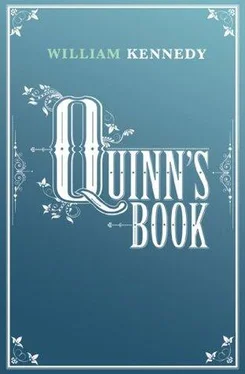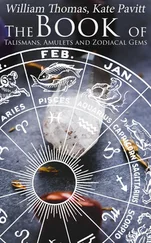“Now tell about son Dirck,” said Max.
“He’s a nuisance and a most foolish child,” said Hillegond, her eyes closed. “He won’t go to church, and he talks back to his mother. He won’t play with other children, for all he wants to do is draw pictures and read books, which isn’t healthy in a young boy. I tell him he’ll turn into an idiot from being alone so much, and I only allow him to wear clothing that doesn’t fit him so he’ll look even more foolish than he is. ‘When you behave properly you shall have proper clothing,’ I tell him, but he doesn’t change. I would have my husband whip him if I had a husband. I had such hopes for the boy. I thought he would grow up to make us proud of the Staats name again. I thought he would make new money for us and preserve our mansion, but he can’t button his own shoes.”
“Please tell of Dirck, and where is,” said Max.
Hillegond pressed the paper closer to her ear, opened her eyes in a gaze at nothing in particular, and then in a voice several tones higher than her previous pronouncements, spoke with the articulation of a masterful actress.
“My son is a splendid man. He is tied to a chair and watched by a man with a mustache and an old woman in a plaid dress. My son is unhappy to an immoderate degree. People are cruel to him but he is strong and healthy. My son worries about his work and his books, and they are not feeding him. My son will not let these inferior people destroy his will to persevere on behalf of rectitude. My son is a grand citizen of the republic and serves his country with the same nobility that marked the careers of his ancestors. My son is in a black state of mind. My son is vomiting. My son—”
“Where is son?” asked Max.
“I don’t know the place.”
“Talk about place.”
“The place is. . on a road. I can’t see the place. The place is in the country? I don’t know. By a hill? I can’t see the place. I can’t, I can’t—” and Hillegond swooned in her chair, the paper fluttering to the floor at my feet. I picked it up and saw it to be two very short lines of runic writing comparable to the script in Dirck’s ledger. I handed the paper to Will as Max spoke urgently into Hillegond’s ear and brought her out of her swoon. She awoke from the trance complaining of a severe headache, and Max immediately lowered her head between her knees, passed his hands over the back of her neck, raised her up, and poof, her headache was gone.
“That was quite fascinating what you said,” Will told her.
“What did I say?”
“You were talking about Dirck. You said he might be on a country road. Which road?”
“I have no idea,” said Hillegond. “I don’t even remember saying it.”
“She will remember if I tell her remember,” said Max.
“Then you should tell her.”
“In time.”
“Where’d you get this paper?” Will asked her.
“Dirck’s room,” she said. “I found it in an old envelope. It’s those crazy drawings he’s been doing all his life.”
“Do you know what they mean?” asked Will.
“Of course not. They don’t mean anything.”
Will nodded and stuffed the paper into his pocket.
“You mentioned a man with a mustache,” Will said. “Do you remember him?”
“Nothing,” said Hillegond.
“Make her remember,” Will said to Max.
“Is too soon,” said Max with a defiant lip.
“Can’t be soon enough if there’s anything genuine in all this hocus-pocus,” said Will. “You make her remember right now or I might forget I’m a gentleman.”
Max paused long enough to suggest his imperviousness to threat, then turned to Hillegond. “You will remember everything you tell about son,” he said.
“I remember the man had a long, drooping mustache and a bald head and very shifty eyes,” said Hillegond immediately.
“Was it Aaron Plum?” said Will.
“Yes, I think it was. How could you know that, Will?”
“I have special bumps of my own,” said Will.
Hillegond continued recalling all she’d told us and Will quizzed her further on the Plum family. She knew them, but not well. I told Will then for the first time about how John the Brawn and I had carried what were probably stolen harnesses for Aaron Plum and his brother Peaches, and I also added the story of Peaches’s theft of my broken spade.
“I think we should pay another visit to the Plums,” Will said. He had gone to the Plum farm immediately after the kidnapping but found only a handyman, and no family.
“You must be careful,” Hillegond said. “They’re dangerous people.”
“It will only be a social call,” said Will. “We’ll inquire about Daniel’s spade.”
“It’s worthless,” I said.
“Maybe so, but that worthlessness is yours, not theirs.”
We excused ourselves from Hillegond and she said she would have Matty get my old room ready for when I returned. I thought of Maud and how we had lived under this same roof for months, and I grew sad and vowed we would live together again one day. But of course that was an empty wish and Maud was God knows where.
Will and I walked to Will’s house through the open fields, the sky cloudy bright. In his barn he hitched one of his three horses to a wagon and gave me my first lesson in Plum history, about which he had written much.
The first Plum in the New World was Ezra, who came to Albany from England in 1759 at age eighteen and hired on as the city’s official whipper. In 1786 he was promoted to city hangman, expediting into the beyond numerous robbers, counterfeiters, and forgers until 1796, when whipping posts and execution, except for murder, were abolished. In 1801, when Ezra was sixty, an unknown assailant cut off his head with an ax — the assailant widely believed to be his grandson, Jeremiah.
Jeremiah was the son of Ezra’s only child, Bliss, who first proved that murder ran in the family. At age twenty, married only three weeks, Bliss informally executed two of his young cousins, newly arrived from England, clubbing one, hanging the other, thus removing them as competition for an inheritance Bliss coveted. Bliss feigned innocence but in time confessed and was hanged before he turned twenty-one.
Bliss’s son, Jeremiah, was conceived during Bliss’s three-week marriage to a woman named Blessed Benson. Jeremiah, born the year his father swung, inherited all Plum property and became family patriarch in our time-present, 1850.
Jeremiah married Priscilla Swett of Vermont, who, at a later moment, was convicted of almost eviscerating a woman neighbor with a carving knife in an argument over the neighbor’s fur hat, which Priscilla, called Priss, had stolen. Priss was sentenced to twenty years in jail but that was reversed in higher court through the influence of her son, Mason Plum, a lawyer who earned fame for keeping his family out of jail.
Other Plums: Aaron, a blond hunter thrice charged with near murders; Hanna, a beauty; and Eli (Peaches), whom Priscilla claimed as her own in order to cap a scandal, for Peaches was actually the offspring of his own sister, Hanna, when Hanna was fifteen. And the sire was Hanna’s father, Jeremiah. There was also Fletcher Plum, a cousin, whose talent for stealing horses and altering their color and markings with charcoal and dye was so well developed that even the owners of the horses were deceived. There were other Plums, but enough.
Will put a pistol in his belt, and another under a blanket on the seat between us as we drove toward the Plum farm. Will assured me there would be no violence, that the pistols were only to fend off highwaymen, but I didn’t quite believe that.
“All I want you to do when we get to the Plums’,” Will said to me, “is to identify that spade if we come across it. Otherwise let me do the talking.”
Читать дальше












